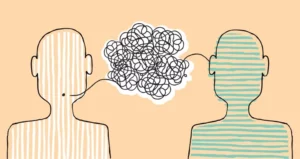Existential therapy is a type of psychotherapy that focuses on the meaning of life and the existence of humans. It is a relatively new practice, and there is still some controversy surrounding it. However, many people find existential therapy to be helpful in addressing their psychological issues. In this blog post, we will discuss what existential therapy is, the benefits and drawbacks of this approach, and who might benefit from it.
Contents
What Is Existential Therapy?
 We all know the feeling of being lost and feeling like life has no meaning. This can be a normal part of life, but for some people, these feelings are constant and overwhelming. Existential therapy is a type of psychotherapy that focuses on the meaning of life and the existence of humans. This approach can help people who are struggling with existential issues such as anxiety, depression, and loneliness.
We all know the feeling of being lost and feeling like life has no meaning. This can be a normal part of life, but for some people, these feelings are constant and overwhelming. Existential therapy is a type of psychotherapy that focuses on the meaning of life and the existence of humans. This approach can help people who are struggling with existential issues such as anxiety, depression, and loneliness.
Existential therapy is based on the idea that humans are responsible for their own lives and that we must create our own meaning in life. This can be a scary prospect for some people, but it can also be empowering. Existential therapy can help people to find meaning in their lives and to become more self-sufficient.
It is important to note that existential therapy is not the same as existentialism. Existentialism is a philosophical movement that emphasizes the existence of humans and the subjective nature of reality. Existential therapy, on the other hand, is a type of psychotherapy that uses existential principles to help people address psychological issues.
How Does It Work?
The process of existential therapy usually begins with the therapist asking the client about their life and what is important to them. The therapist will then help the client to explore their beliefs and values. This can be a difficult process, but it can also be very enlightening. After the initial exploration, the therapist will help the client to set goals and make plans for change.
One of the most important aspects of existential therapy is the relationship between the therapist and the client. The therapist should create a safe and supportive environment for the client to express their thoughts and feelings. The therapist should also be open to hearing about the client’s experiences and perspectives.
The overall process may seem daunting and also a bit vague, but that’s actually one of the strengths of existential therapy. This approach is flexible and can be adapted to meet the needs of each individual client.
What Are The Techniques Used?
Existential therapy is a broad and interdisciplinary practice which means that there are a variety of techniques that can be used. Some common techniques include:
Psychoanalysis
 Proposed by Sigmund Freud over a century ago, psychoanalysis is still one of the most popular and influential approaches in psychology. This method focuses on the role of the unconscious mind in shaping human behavior.
Proposed by Sigmund Freud over a century ago, psychoanalysis is still one of the most popular and influential approaches in psychology. This method focuses on the role of the unconscious mind in shaping human behavior.
Within psychoanalysis, there are techniques that can aid the matter of existential therapy, such as:
- Free Association: This is a method where the patient says anything that comes to mind without censoring themselves.
- Dream Analysis: This technique involves interpreting the patient’s dreams in order to understand the unconscious mind.
- Transference: Transference occurs when the patient projects their feelings onto the therapist. This can be helpful in understanding the patient’s relationships with other people.
Existential Analysis
Existential analysis is a type of psychoanalysis that was developed by German philosopher Martin Heidegger. This approach emphasizes the existence of humans and the subjective nature of reality. It encompasses a wide range of topics, including death, freedom, and identity. These inevitably result in a focus on the human condition.
Within existential analysis, there are techniques that can aid the matter of existential therapy, such as:
- Phenomenological Reduction: This is a method that allows the therapist to understand the patient’s experiences from their point of view.
- Hermeneutic Interpretation: This technique involves interpreting the patient’s experiences in light of their cultural and historical context.
- Dialogue: Dialogue is a type of conversation that can be used to explore the patient’s thoughts and feelings.
Logotherapy
Logotherapy is a type of existential therapy that was developed by Austrian psychiatrist Viktor Frankl. This approach emphasizes the search for meaning in life. It is based on the belief that humans are motivated by a need to find meaning and purpose.
Within logotherapy, there are techniques that can aid the matter of existential therapy, such as:
- Meaningful Activities: This is a method that involves helping the patient to find meaning in their everyday activities.
- Values Clarification: This technique helps the patient to identify and clarify their values.
- Reflection: Reflection is a process of introspection that can help the patient to gain insight into their thoughts and feelings.
Gestalt Therapy
 Gestalt therapy is a type of psychotherapy that emphasizes the importance of awareness and understanding the self. This approach can be helpful in dealing with existential issues. It came into existence in the 1940s and was developed by Fritz Perls.
Gestalt therapy is a type of psychotherapy that emphasizes the importance of awareness and understanding the self. This approach can be helpful in dealing with existential issues. It came into existence in the 1940s and was developed by Fritz Perls.
Within gestalt therapy, there are techniques that can aid the matter of existential therapy, such as:
- Empty Chair Technique: This is a method where the patient imagines that someone else is in the room with them. They then have a conversation with this imaginary person.
- Role-playing: This technique involves the patient acting out different roles in order to gain insight into their own behavior.
- Guided Imagery: This is a method where the therapist helps the patient to imagine different scenarios in order to explore their thoughts and feelings.
Clinical hypnosis
Clinical hypnosis, also famous by the name hypnotherapy, is a process of trance induction with the help of a hypnotherapist in order to achieve therapeutic goals. The therapist guides the patient into a state of relaxation and focus, where they are more open to suggestion. This can be helpful in dealing with existential issues.
Some techniques that can aid the matter of existential therapy are:
- Age Regression: This is a method where the patient is guided to imagine themselves in a past situation. This can be helpful in understanding their current behavior.
- Future Progression: This technique involves the patient imagining themselves in a future situation. This can help them to gain insight into their current thoughts and feelings.
- Inner Child Work: This is a method where the patient is guided to connect with their inner child. This can help them to understand their current behavior and emotions.
Narrative therapy
 Narrative therapy involves the client to act like a narrator. This means that the therapist will help the patient to understand their current situation by looking at their past experiences. This can be helpful in dealing with existential issues.
Narrative therapy involves the client to act like a narrator. This means that the therapist will help the patient to understand their current situation by looking at their past experiences. This can be helpful in dealing with existential issues.
Some techniques that can aid the matter of existential therapy are:
- Life Story telling: This is a method where the patient tells their life story to the therapist. This can help them to gain insight into their current situation.
- Externalization of Problem: This technique involves the patient talking about their problem as if it is an external entity. This can help them to deal with their problem in a more detached way.
- Reframing: This is a method where the therapist helps the patient to reframe their problem in a more positive light. This can help them to deal with their problem in a more constructive way.
Expressive arts
Expressive arts have made their way into the field of therapy as a way to deal with existential issues. This is because expressive arts can help the patient to express their thoughts and feelings in a creative and non-verbal way.
Some techniques that can aid the matter of existential therapy are:
- Art Therapy: This is a method where the patient uses art to express their thoughts and feelings. This can be helpful in dealing with existential issues.
- Music Therapy: This is a method where the patient uses music to express their thoughts and feelings. This can be helpful in dealing with existential issues.
- Dance Therapy: This is a method where the patient uses dance to express their thoughts and feelings. This can be helpful in dealing with existential issues.
Introspection
Let us begin by breaking down the word to understand its meaning. Intro- means “within” and -spection means “to look.” Therefore, introspection is the act of looking within oneself. This can be helpful in dealing with existential issues because it allows the patient to understand their thoughts and feelings on a deeper level.
Some techniques that can aid the matter of existential therapy are:
- Journaling: This is a method where the patient writes down their thoughts and feelings in a journal. This can be helpful in dealing with existential issues.
- Meditation: This is a method where the patient focuses on their breath and allows their thoughts to come and go. This can be helpful in dealing with existential issues.
- Contemplation: This is a method where the patient reflects on their life and what it means to them. This can be helpful in dealing with existential issues.
Empathetic listening
 As the name suggests, empathetic listening is the act of listening with empathy. This means that the therapist tries to understand the patient’s experience from their perspective. This can be helpful in dealing with existential issues because it allows the therapist to understand the patient on a deeper level.
As the name suggests, empathetic listening is the act of listening with empathy. This means that the therapist tries to understand the patient’s experience from their perspective. This can be helpful in dealing with existential issues because it allows the therapist to understand the patient on a deeper level.
Some techniques that can aid the matter of existential therapy are:
- Active Listening: This is a method where the therapist paraphrases what the patient has said to them. This can be helpful in dealing with existential issues.
- Reflective Listening: This is a method where the therapist reflects back the emotions that they are sensing from the patient. This can be helpful in dealing with existential issues.
- Genuine Listening: This is a method where the therapist listens to the patient without judgement. This can be helpful in dealing with existential issues.
Cognitive reframing
This refers to the process of changing the way we think about something in order to change our emotional response to it. This can be helpful in dealing with existential issues because it allows the patient to change their perspective on their problem.
Some techniques that can aid the matter of existential therapy are:
- Challenging Negative Thoughts: This is a method where the therapist challenges the patient’s negative thoughts and helps them to see things in a more positive light. This can be helpful in dealing with existential issues.
- Identifying Cognitive Distortions: This is a method where the therapist helps the patient to identify their cognitive distortions and challenge them. This can be helpful in dealing with existential issues.
- Replacing Negative Thoughts: This is a method where the therapist helps the patient to replace their negative thoughts with more positive ones. This can be helpful in dealing with existential issues.
Bibliotherapy
This is a rather unique method that uses books to help the patient deal with their existential issues. This is because books can provide the patient with a different perspective on their problem.
Some techniques that can aid the matter of existential therapy are:
- Reading: This is a method where the patient reads books that relate to their problem. This can be helpful in dealing with existential issues.
- Discussion: This is a method where the patient discusses the book that they have read with the therapist. This can be helpful in dealing with existential issues.
- Writing: This is a method where the patient writes about the book that they have read. This can be helpful in dealing with existential issues.
Support groups
 At last, support groups consist of a group of people who are dealing with the same problem. This can be helpful in dealing with existential issues because it allows the patient to feel less alone.
At last, support groups consist of a group of people who are dealing with the same problem. This can be helpful in dealing with existential issues because it allows the patient to feel less alone.
Some techniques that can aid the matter of existential therapy are:
- Sharing: This is a method where the patient shares their thoughts and feelings with the group. This can be helpful in dealing with existential issues.
- Listening: This is a method where the patient listens to the thoughts and feelings of others. This can be helpful in dealing with existential issues.
- Learning: This is a method where the patient learns from the experiences of others. This can be helpful in dealing with existential issues.
What Are The Benefits?
Despite the controversies, existential therapy does have its benefits. It has taken its time to develop into the practice it is today.
Some benefits of existential therapy are:
- Awareness: This is a benefit where the patient becomes aware of their thoughts and feelings. This can be helpful in dealing with existential issues.
- Acceptance: This is a benefit where the patient accepts their thoughts and feelings. This can be helpful in dealing with existential issues.
- Change: This is a benefit where the patient changes their thoughts and feelings. This can be helpful in dealing with existential issues.
Moreover, there are also a variety of clinical disorders that existential therapy can be used to treat. Some disorders that existential therapy can be used to treat are:
- Anxiety disorders
- Depressive disorders
- Eating disorders
- Obsessive-compulsive disorder
- Sleep disorders
- Psychosis
- Schizophrenia
- Personality disorders
- Substance abuse disorder
- PTSD
There are also a ton of emotional benefits that patients can experience from existential therapy. Some emotional benefits are:
- Anger management
- Grief counseling
- Guilt management
- Forgiveness
- Improved self-esteem
- Life transitions
- Increased self-awareness
- Improved relationships with others
- Greater insight into their problems
In severe cases, people who have escalated into severe emotional distress or are suicidal may also be helped by existential therapy.
Are There Any Drawbacks?
Of course, no therapy is perfect and existential therapy does have its drawbacks. It is important to be aware of these before you decide to try it.
- One of the main criticisms of this approach is that it can be too philosophical and abstract. This can make it difficult for some people to understand and apply to their lives.
- Additionally, existential therapy often requires a great deal of self-reflection and introspection. This can be challenging for some people who are not used to looking inward.
- Another drawback of existential therapy is that it can be quite confronting. This is because it often deals with topics such as death, freedom, and choice. These topics can be difficult for some people to face.
- Finally, existential therapy can be quite slow. This is because it often takes time for people to make the necessary changes in their lives.
Despite its drawbacks, existential therapy can be a helpful approach for some people. If you are struggling with existential issues, it may be worth considering this type of therapy.
How To Get Started?
 If you are looking to start existential therapy, there are a few things you can do.
If you are looking to start existential therapy, there are a few things you can do.
- First, find a therapist who is trained in this approach. This is important because you want to make sure you are working with someone who is qualified.
- Second, make sure you are comfortable with the therapist. This is important because you will be sharing some personal things with them.
- Third, be prepared to do some work outside of therapy. This is because existential therapy often requires a lot of self-reflection and introspection.
- Finally, be patient. This is because existential therapy can be quite slow. It often takes time for people to make the necessary changes in their lives.
If you are considering existential therapy, it is important to keep these things in mind. Existential therapy can be a helpful approach for some people, but it is not right for everyone. If you are struggling with existential issues, it may be worth considering this type of therapy. With the help of a qualified therapist, you can begin to explore these topics and make the changes you need in your life!
Conclusion
In conclusion, existential therapy is a controversial practice that has both benefits and drawbacks. If you are struggling with existential issues, it may be worth considering this type of therapy. With the help of a qualified therapist, you can begin to explore these topics and make the changes you need in life!
If you or someone you know is looking for psychological help, Therapy Mantra is here for you. We are the leading providers of online therapy and counseling. Our team of highly trained and experienced therapists can provide assistance at the most affordable rates. Contact us today to learn more about our services. You may also visit our website to book an online therapy session or download our free Android or iOS app for more information.


